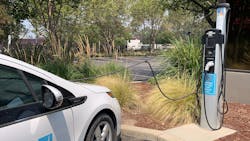PG&E Begins Installing EV Chargers at Schools
Pacific Gas and Electric Company (PG&E) announced it has broken ground on the first of up to 130 new electric vehicle (EV) charging ports at 22 schools in its service area. The first installation is at Eastside College Preparatory School in East Palo Alto, Calif. Overall, PG&E’s EV Charge Schools pilot program aims to help fill charging gaps at these locations and support California’s clean transportation and decarbonization goals.
Through the EV Charge Schools pilot, PG&E will install level 2 charging stations at school facilities and educational institutions for staff, parents and students to charge their EVs, with access varying by location. PG&E will help fund the costs of purchasing and installing the EV charging equipment and networking fees at these schools as well as ongoing maintenance and operations. With up to 40% of the new chargers located in disadvantaged communities, the pilot will help to bring EV charging options to customers who might not have had them before.
PG&E also will develop EV and sustainability curriculum for all schools in its service area along with teacher training options. The kindergarten through grade 12 curriculum will allow teachers to connect classroom learning to real-world infrastructure and help expand awareness of clean energy transportation.
“By increasing charging access at schools, we strive to make electric vehicles a viable option for more Californians. Expanding the use of clean transportation and reducing vehicle emissions is good for our state, our customers and the environment,” said Aaron August, vice president, business development and customer engagement, PG&E.
Why Clean Transportation Matters
Clean transportation efforts are a central pillar of PG&E’s Climate Strategy Report, which outlines the company’s plans to reach net zero greenhouse gas emissions by 2040, five years ahead of the state’s target, and to start actively removing more greenhouse gases from the environment than it emits by 2050. To help reach these goals, PG&E plans to be the industry’s global model by preparing its grid to fuel at least 3 million EVs by 2030 — leading to a cumulative reduction of 58 million metric tons of carbon emissions.
These recent commitments build upon PG&E’s history of leadership in the area of clean transportation. Over 420,000 EVs have been sold in PG&E’s service area, representing one in six EVs in the country. Increasing EV adoption can play a critical role in supporting California’s goals to reduce emissions as transportation is the single largest source of greenhouse-gas emissions in the state, contributing nearly 40%. Passenger vehicles alone account for nearly 29% of the state’s total emissions. By 2035, 100% of California sales of new passenger cars and trucks will have zero tailpipe-emissions.
The electricity fueling EVs in California comes from one of the cleanest energy mixes in the country. PG&E estimates that 93% of its customers’ electricity in 2021 came from greenhouse gas-free resources.
PG&E’s Continued Support for EVs
- As part of its first EV charging infrastructure program, EV Charge Network, PG&E installed 4,827 Level 2 EV charging ports at customer sites across Northern and Central California.
- EV Fleet Program: Aims to install or rebate make-ready electrical infrastructure to support the adoption of 6,500 medium- and heavy-duty EVs.
- EV Fast Charge Program for Public Fast Chargers: Complements state and privately funded initiatives by installing Direct Current (DC) fast charging in highway corridor and urban sites. PG&E has seen high demand for the program, receiving five times the applications for available funding.
- EV Charge Parks: Will provide charging infrastructure at California State Parks and Beaches in support of California’s electrification goals.
- Special Rates, Rebates and Tools: PG&E offers electric rate plans tailored for EV drivers and provides tools such as PG&E’s EV Savings Calculator and Fleet Calculator (ev.pge.com and fleets.pge.com) to help customers understand costs when deciding whether to drive an EV.
For more information, visit pge.com/ev.
